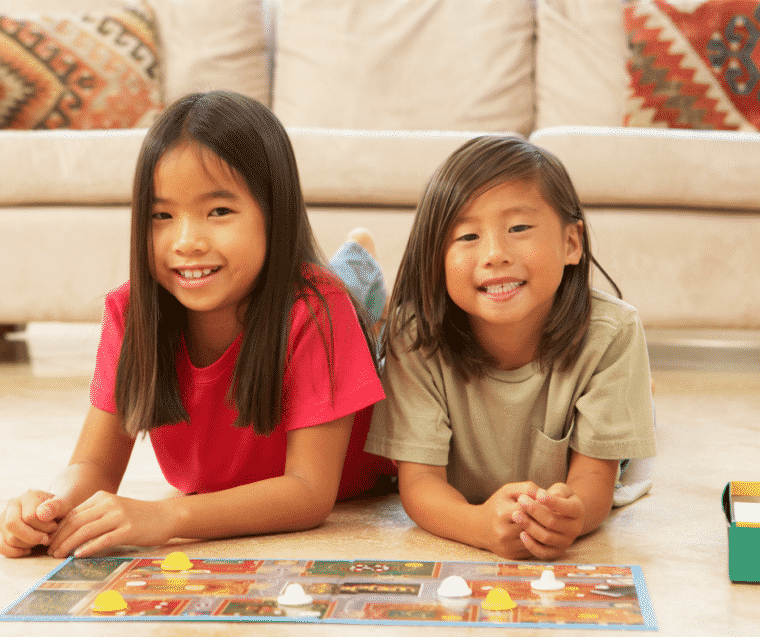By Andrea McCracken
 One afternoon my two daughters ‘E' and “K' had finished up eating and wanted to play. We settled on bingo, but as the game progressed, E determined that she wasn't going to win the game and clearly did not like it. From that moment on, a dark cloud came over our fun play time.
One afternoon my two daughters ‘E' and “K' had finished up eating and wanted to play. We settled on bingo, but as the game progressed, E determined that she wasn't going to win the game and clearly did not like it. From that moment on, a dark cloud came over our fun play time.
Every time K and I made a match, E would complain.
“I'm not even going to come in second.”
“I'll be last!”
It was true. K called bingo, followed by me.
“I want to play again,” E said, hoping for a second chance.
We had time to play again, so we did, even though I was dreading the thought that she might lose again. She was still in a dark mood, saying “I know I won't win, K's going to win again,” over and over and as card upon card was drawn, sure enough, K called bingo first.
Then me.
Then E.
Last.
She felt slighted by the draw of the cards. The ‘bingo gods' had not chosen her matches until the end. She did not emerge the winner. As she tried to hold back the tears, I could see that she wanted to be happy for her sister, but she didn't feel happy.
She asked to play again, but this time I had to tell her that we didn't have time for another game.
She would have to end her two games of bingo without winning.
She kicked and cried then about losing! I repeated, gently, that we would not be playing again and that she would leave this play session as the losing player. I stayed with her and held her while she cried and yelled. I repeated that I loved her. I hugged her close – as much as I could.
Finally, she began asking questions about me not winning. I told her it didn't bother me, that all I wanted was to play the game so that I could have fun with my daughters. It didn't matter to me who won. And although we didn't play bingo again that day, she moved on to her next activity happy. She had released her upset about losing and felt able to be flexible and loving again.
 Why is One Child More Competitive Than Another?
Why is One Child More Competitive Than Another?
Modern life trains us to be competitive, but some children are more eager to win than others and feel hugely let down if they lose. Why is this? Hand in Hand's founder Patty Wipfler says the need to win often stems from some earlier emotional upset when a child may have felt helpless or alone. Wanting to win tells you that this time he wants to be noticed, and he wants to feel good about himself too.
So, Should I Let Her Win?
Children do not need to win all the time, but in trying to do so they are seeking your attention. Don't steer clear of competitions, but do be ready for some emotions. You can use a ‘win some, lose some' approach to support their needs.
- Employ affectionate games that produce big belly laughs that offset her emotions and show her you are right there. These sessions are immensely healing and clear out tension. We call the tool Playlistening.
- You can also play competitive games where you are the loser. In tag you get caught, in pillow fights, you fall over, in soccer, you let the ball into the goal. Let her experience that thrill of winning in your safety so that she can play out the feelings.
- When she plays competitive games but loses you can also expect those tensions to pour out in tears and tantrums. Stick around, don't say much, and let her tell you as much of what she is feeling as she can. We call this Staylistening and it's a great way to let them release some of those feelings. She'll feel lightened after a cry, although with really competitive kids, you can expect a good few sessions before that winning spirit quietens.
Three Ways to Help Sore Losers:
Games of Skill:
This is the chance for you to let him win in a playful manner. In baseball you might swing and always miss that ball, in skittles, you just cannot roll straight – the ball may even end up over your shoulder, ham it up and give him a giggly, fun session that allows him to win over and over. If he is having difficulties in a group game, try joining in and losing that too – your goofiness will draw the heat away from him, provide lots of light humor and dissolve the ugly side of competitive gameplay.
Games of Chance:
In games of chance like bingo outcomes can't be forged, and staying close and listening to the upset shows your support. By getting the hurt and the tears out, your child is processing her feelings about losing and wiping her slate clean, and like E exploring new outcomes – like the possibility that its “ok” to lose. During everyday life later on, you might point out when things “happen by chance” to reinforce the difference between skill and luck. It might help to point out any times you don't win at a game. “I guess that's just the luck of the draw,” is a good model sentence.
General Competitiveness:
If you want to tone down a general sense of competitiveness – “I'm faster/better/stronger” scenarios – try playfully introducing some fun ‘penalties' for winning that actually build his emotional safety. When he ‘boasts “I'm first” say, “Hurray! The winner gets a great big hug from the hug monster, I bet I can hug you right now,” so that he runs away and you give chase. Or ‘Award' him 100 kisses from you and ask, “Shall we get started right now?”
When you combine playful responses and winning with limit setting and losing you come at the issue from all angles. You give your children the love and affection they crave and the safety they need to explore their fears. Soon they become more comfortable with the idea that every game has two sides.
- If your child is very competitive, read this article for more solutions
- To understand more about how kids' emotions work download this booklet
- The book Listen is out now and gives you five tools to help hear your child
Andrea McCracken is a candidate in the Hand in Hand Instructor Certification program.